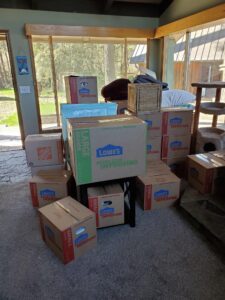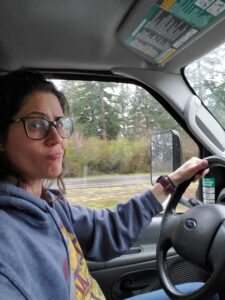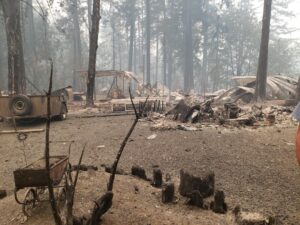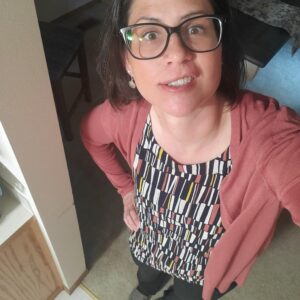I fell asleep praying to God in weeps, begging Him to help me because I had just lost my best friend and lover of 24 years, the father of my children, and 75% of our income. My house was a construction site of renovation projects that my husband had started, and I had no idea how to finish, and the mortgage was more than my monthly wages. Through death, I had become immediately and solely responsible for three car payments, two high schoolers and my oldest in her 20s, student loans, credit card debt, and a “project” home. What I wanted to do was grieve. What I needed to do was figure out how to survive. Just tell me what to do, God. Please tell me what to do. I don’t know what to do.
How did He respond? He said nothing. Instead, I had a nightmare so evil I can still remember every detail (standing in my driveway, the cold gravel beneath my feet, the peculiar red sky in the distance, the forest around me void of all wildlife, the dreadful sense that I was in trouble). I still remember the feeling of terror when I awoke, freezing in the blackness of my bedroom. I still remember calling my mother like a toddler, wailing on the phone because I couldn’t shake the nightmare and the feeling that something bad, something big, was coming to the house to get me and the kids.
My voice was shaking. “I think I need to move, Mom.”
My mother responded with logic. “It’s your grief, baby. Breathe. Breathe. This is what grief is. Selling the house will not make anything better. You can’t outrun this. Please, just breathe and think this through.”
She was almost 6 hours away in California, listening to her first born – me, a woman in her 40s – unravel. She took emergency family leave, made the drive, knocked on the door and helplessly stood by while I destroyed my own life on account of a dream. I still ache over my lack of empathy when she broke down crying after I listed the house.

“Mom.” I grabbed her by the shoulders and made eye contact. “JD is not this house. He is not. That’s not how this works.”
I can still feel the hollowness of my words. I can still hear her voice cracking as she erupted into tears. She was grieving too, but she wasn’t on board with my decision to move, so I sent her home.
Within a week I had put in my two-week notice, put my Oregon house up for sale, and found a place to live in the state of Washington, a little island where my oldest was temporarily stationed in the Navy, preparing to ship out to Japan. It was called Whidbey Island. I remember thinking, at least I can see her for a few weeks before she ships out.
I had no plan for what came afterward. I had applied for a few jobs on the island and landed an interview for an accounting technician (way outside my field of teaching) – but they didn’t hire me, so I was back to square one with no plan.
Most – that’s nonsense – ALL – of my friends and family were worried, most having yanked me into their offices, called, or dropped by to shake some sense into me, and rightfully so. My behavior was erratic.
The worst thing you can do is quit your job right now!
You won’t even have insurance!
Do you even have a job offer on the table?
You’re selling your house and moving to Washington?!
The only comfort your kids have left is their school, friends, and the house.
Why would you take that from them?!
That house is your husband’s legacy – why would you take that from the family?
Why are you doing this?!
My response – “I don’t know. It’s a God thing. I don’t expect you to understand.”
But the truth was, I didn’t understand either, and I didn’t know if this was actually a God thing, or if everyone was right, and I was an unhinged, desperate widow. Either way, moving to Washington became my white whale – my monomania. I had gone to sleep pleading for help and woken from a nightmare with a mission. Nothing could stop me, not even me. I was completely focused, and completely out of my mind.
COVID hit, schools went into full lockdown, and the kids shifted to online schooling. There was a rumor that the state border between Oregon and Washington was going to close at midnight, so I called a family meeting – because we’re the Wolfes; we do things as a pack, and I was the new alpha.
The kids and I hatched a plan to leave immediately with our most important things and the understanding that if state borders closed, we may not see this house or anything we left behind, for a long time. Six hours later, we had all three cars loaded, including four cats and three dogs, important documents (death and birth certificates, social security cards, military documents), laptops, phones, clothes, and special things – my wedding rings, his dog tags, a picture of us walking hand-in-hand on the Oregon coast.
We would caravan. I would lead. My youngest (who had never driven more than her fifteen-minute drive to school) would take the middle, and my son would bring up the rear. Ashley, my oldest, would be on high alert making “check in” phone calls every 30 minutes to make sure everyone stayed awake while we drove through the night. The most important thing was making it to the Washington border by midnight.
It’s a 6-hour drive to Whidbey Island, not too long, but our caravan included inexperienced teen drivers. Our muscles ached from packing and loading, our spirits were heavy with grief, and our minds were consumed with the uncertainties of the pandemic. When we pulled out of the driveway, I watched our Lyons, Oregon house grow smaller and smaller until it disappeared in my rearview mirror. Our family motto rang in my ears, something my husband had started: Us against the world.
Yup, us against the world, baby. I gave the kids a thumbs up out the window, and together we headed north up Interstate 5.
Adrenaline got us across the border, then we slept for two hours in a Safeway parking lot. We hit the road again around 2:30am, and I let the kids fuel up on Monsters and Red Bull (a rare occasion). Then we followed I-5 for the rest of the night, the cones of our headlights the only future we could see.
When we finally crossed Deception Pass Bridge, the gateway to Whidbey Island, the sun was rising. Ashley met us in the driveway, and she had news.
She wasn’t going to Japan, but she wasn’t going back to Virginia where she was previously stationed with her fiancé, either. Instead, the Navy had stationed her permanently on the island and reassigned her from machinist mate to administrative duty. The last thing a woman does before shipping out to sea – is take a pregnancy test, and she was unknowingly 6 weeks along with my first grandchild, a boy who would bear his grandfather’s name and enter this world on my wedding anniversary, November 9th.

State borders stayed open, and we made 11 more trips with a small U-Haul (the biggest one I could handle driving) to get the rest of our things and sell the house. We received no moving help on account of COVID and “tough love” from friends who “couldn’t be part of this” – this, meaning, my self-sabotage.
Fifty days later – I accepted a job offer with a barely livable wage. It was the same job that had previously turned me away. Turns out I was their runner up. COVID had lumped the position into its “essential workers” category, so an additional position had opened, and they called me.
Ten days after that – a massive wildfire with east winds reaching speeds of 50mph tore through Lyons, Oregon forcing emergency evacuations – and burned our old house to the ground.
I called my mom. “The dream. The dream was about the fire.”
A text came through. It was from a friend, someone who had tried to talk sense into me.

It was only five words, but I will never forget them.
It said, “That’s some God you have.”
It’s been almost five years since I’ve thought about any of this, and the world looks very different now. I live in Maryland with my youngest who is in college. My oldest lives just down the street from me. She married her fiancé and gave birth to her second about a year-and-a-half ago, a baby girl. Together they have four children. My son just graduated with his bachelor’s degree.

Yesterday, a Facebook memory popped up — a picture of my first day on the job back on Whidbey Island, just ten days before the house burned down, and a flood of memories hit me, which is something I am learning is called – a grief trigger. The me in that picture wasn’t sure if her actions were based in faith or a woman stricken with grief.
But the me looking back at her is proud of her strength, proud of her ability to survive, proud of the way she protected her family, and proud of the tiny little thread of faith that she had.
I called my mom and together we recounted the story about the dream and the move. She can quote scripture like a pastor, so I listened while she connected things to Matthew 17:20 — With faith even as small as a mustard seed, you can move a mountain.
“You had the faith of a mustard seed, baby.”
I laughed. “Ah, so that’s what that looks like.”
*Note: The featured image for this post is the only family picture we have that includes both my husband, JD, and Micah, my son-in-law. We are at the Oregon house (The River House) and this was the first time we met “the boy.” They were only dating here, not even engaged, yet. After meeting him, my husband leaned over and whispered to me. “She’s gonna marry that one — you watch.” 🙂 It is my favorite picture ever.


I jiust love this! I too heard from God and packed up and sold our house of 15 years 6 months after my husband died. When you hear from the Holy Spirit and know you have- no matter what others say or do will change your mind. It’s about “hearing and obeying”. So glad you heard and prayfully you still hear from the Lord, as He is our protector and guide now!
Proud of you. Again, in tears as I read this. Keep the faith!
Aw I love you! Let’s keep the faith together! 🙂
Love you, Sis. 💗